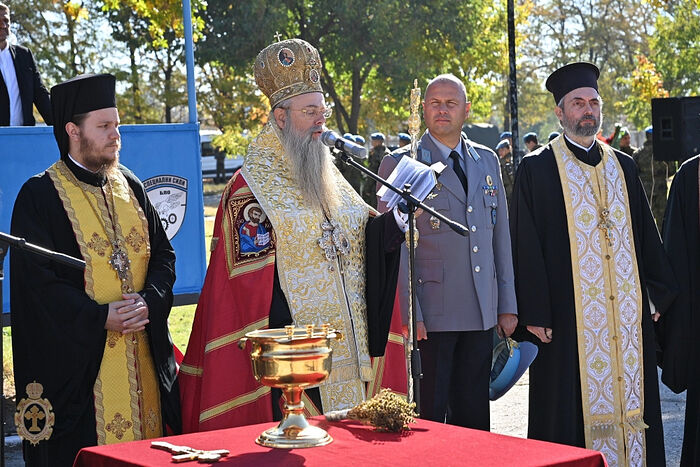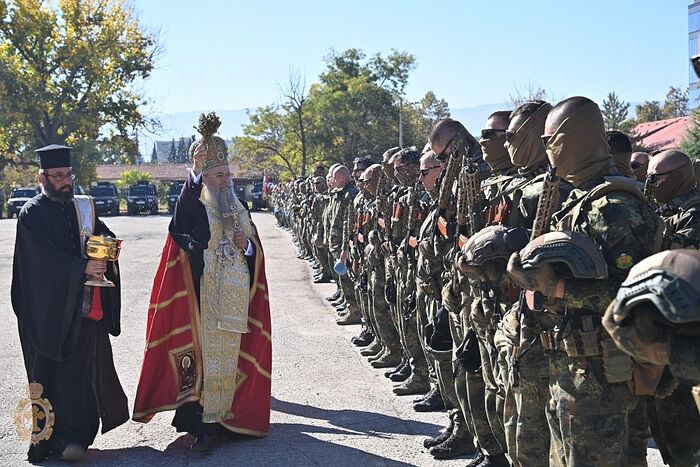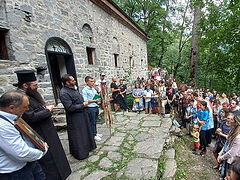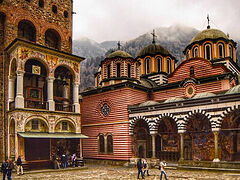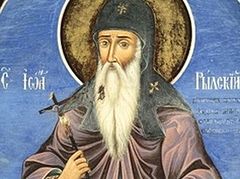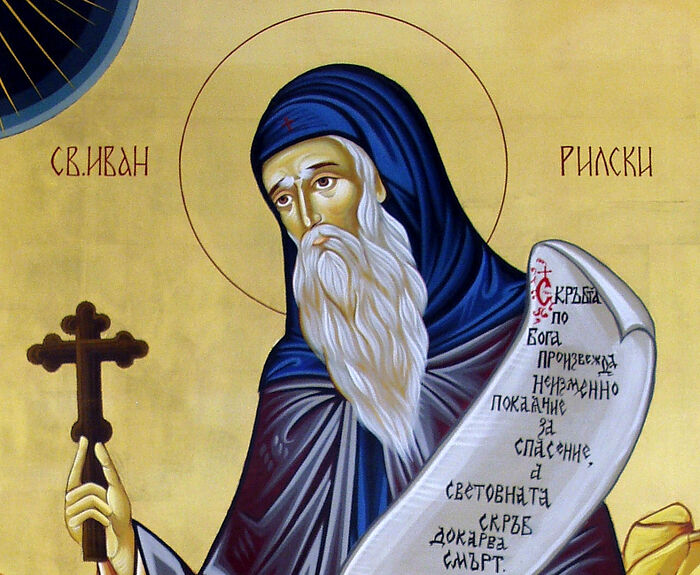 St. John of Rila. Photo: izbite.com
St. John of Rila. Photo: izbite.com
On Wednesday, October 19, the feast of the translation of the relics (1195) of St. John of Rila, Abbot of Rila Monastery in Bulgaria (†946) was celebrated with much jubilation at Rila Monastery. Hundreds of clergy & laity from across Bulgaria, and even one Orthodox pilgrim from the United States, came to fill this monastery with prayers for the intercession of this beloved Bulgarian saint. St. Ivan Rilski was the first Bulgarian monastic hermit and would set the foundation for the later flourishing of monasticism throughout the Bulgarian Empire. His followers founded the Rila Monastery as well as many churches in his honor throughout the Bulgarian nation. The holiness of this saint can be seen throughout his life and at the time before his repose, as told in the following section of his biography:
“As he felt the approach of his departure to the Lord, he devoted himself to prayer. He often wept as he knelt on the ground, saying: “God Almighty, compassionate Lord, accept Your sinful and unworthy servant and by Your grace let me be with Your chosen ones, though I have done nothing good on earth. And because of this, I beg You to send me a good angel that the wily spirits would be not able to hinder my ascent.” He called his disciples together and taught them many things, and commanded them to observe his precepts steadfastly. After my death, do not mourn inconsolably, because I shall not leave you but will be invisibly with you.” He directed them to be diligent in fasting, kissed them all one by one, and received communion. Then he lay on the ground, lifted his hands toward heaven, and saying, “Lord, I rest my soul in Your hands,” he surrendered his soul unto God. He died on August 18 at about the age of seventy, in the 946th year since the Incarnation of God the Word, in the realm of the pious Bulgarian king Peter and the emperor of Byzantium Constantine Porphyrogentitus, the son of the emperor Leo the Wise.
His disciples bathed his feet in many tears, wrapped his holy remains in a shroud, placed them in a wooden coffin, and buried them near an old Skete a walk of an hour and a half to the northeast of the present-day Rila Monastery. People everywhere quickly learned of the death of the holy man and flocked to his grave. His body, without change, looked as though he were asleep and emitted an indescribable fragrance. The sick prayed, begged to be cured, and rejoiced when they were freed from their infirmities.’’1
Services for St. John in Plovdiv
Shortly after the saint’s death, his remains, which were wonder-working, were transferred to Sofia during the reign of Peter I. After Magyar King Bela III conquered Sofia in 1183, Saint John of Rila’s remains were sent to the Hungarian capital Esztergom and remained there for four years before being returned to Sofia in 1187. In 1194, Bulgarian Tsar Ivan Asen I ordered the remains to be moved to his capital, Veliko Tarnovo. Surviving the Turkish conquest of the city in 1393, they were returned to the Rila Monastery in 1469 with the permission of Sultan Murad II, where they have remained into the twenty-first century. St. John is one of Bulgaria’s most influential spiritual leaders and is regarded as the patron saint of the Bulgarian people, which was a reason why one catechumen, Andrei, chose to be baptized on his feast day. Unlike other historically Eastern Orthodox nations like Georgia, it is not unusual for adult ethnic Bulgarians to be unbaptized either due to the effects of Soviet secularism (in the case of Andrei) or because of the Ottoman occupation that has left behind a legacy of Bulgarian Muslims (pomaks).
One other mark of the closeness of St. John of Rila with the Bulgarian nation can be seen in the Armed Forces of the Bulgarian Army, in which the paratroopers have a special holiday on this day. His Eminence Metropolitan Nikolai of Plovdiv held a prayer service on the occasion of this holiday in the yard of the unit of the Joint Special Operations Command in Plovdiv. Blessed at this service were new armored combat and auxiliary equipment for the various formations of the Special Operations Forces.2 The ceremony began with the welcoming of the battle flags and acceptance of formation by the commander of the SKSO, Major General Yavor Mateev. After that, Major General Mateev awarded the most distinguished officers, sergeants, and soldiers. The celebration was attended by the Chairman of the Municipal Council of Plovdiv, Mr. Alexander Durzhikov, the Mayor of Kuklen, Mrs. Maria Belcheva, the former Minister of Defense, Mr. Krasimir Karakachanov, Mayors of municipalities and villages, military commanders, veterans, soldiers from the reserve forces, and representatives of military and various patriotic organizations. His Eminence Metropolitan Nikolai delivered an inspiring speech about the contribution of the Bulgarian Army to their nation, and congratulated them on their holiday.

